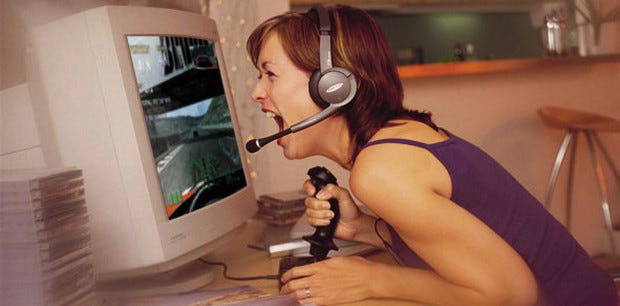Industry and academics unite to oppose World Health Organisation's "gaming disorder"
Does evidence support it?
A number of academics and games industry associations, including the UK's Ukie and USA's Entertainment Software Association, have united to oppose World Health Organisation (WHO) plans to define 'gaming disorder' as a health condition. The WHO, an arm of the United Nations, intend to create 'gaming disorder' with the next revision of the International Classification of Diseases (ICD), their big book o' physical and mental conditions found in this so-called world. They define the disorder as--and I paraphrase--pissing your life away playing video games. While the ICD doesn't dictate policy, it lays foundations and would set a worrying precedent. The industry associations and academics say the classification is rash and could itself be harmful.
The WHO say they define gaming disorder as a pattern of behaviour "characterized by impaired control over gaming, increasing priority given to gaming over other activities to the extent that gaming takes precedence over other interests and daily activities, and continuation or escalation of gaming despite the occurrence of negative consequences." This isn't the odd weekend lost in Skyrim, rather behaviour severe enough "to result in significant impairment in personal, family, social, educational, occupational or other important areas of functioning" over at least a year.
The ICD exists to define conditions so countries can share data to build a global picture, tracking and comparing trends and whatnot. The ICD doesn't classify 'diseases' in the pathogenic sense, to be clear, but a broader meaning of what ails you. The latest big revision, ICD-10 from 1992, includes everything from ebola to voyeurism. While the ICD and WHO don't dictate government policy, they do exist to inform and support decisions. And, obviously, the UN declaring the existence of a "gaming disorder" will fuel moral panic.
Today, a coalition of academics and industry bodies declared their opposition to the draft disorder. On the academic side are people from 34 institutions, largely representing university departments of psychology, sociology, and other social sciences, with a few curve balls like the University of Oxford's Internet Institute. On the industry side, we have trade associations representing publishers in the UK, United States, Korea, Canada, South Africa, Australia and New Zealand, Brazil, South Africa, and elsewhere around Europe. Collectively, they think the WHO should slow down.
In a paper due to be published in the Journal of Behavioral Addictions, the academics don't deny that some people have problematic behaviour around gaming, and indeed say this warrants further study, but they say the WHO are being too hasty to pathologise it. They say the WHO are leaning on studies which are too few and overall too unfocused and flimsy to clearly define a disorder - it'd simply be bad science. They also believe that rushing to a classification would harm players as well as future study of those gaming problems the WHO are so concerned about.
The paper asks, "is what we call 'gaming disorder' merely a coping strategy for those with depression, ADHD or other disorders?" And as it often seems to be, "it would make more sense to explore the underlying causes for this behavior first and be sensitive to the extent to which treating these first-order challenges might resolve the gaming problems." Which sounds jolly sensible to me.
At times in my life I have certainly played games so much that it caused, as the WHO say, "significant impairment in personal, family, social, educational, occupational or other important areas of functioning." That's because I was suffering from crippling depression I couldn't resolve, and playing games offered much-wanted comfort and distraction when everything else was overwhelming. The problem wasn't games, it's that I was shambling wreck of a human. Thanks, video games, for the fun, comfort, and social contact you gave me during years I would likely have otherwise spent in bed.
The authors point out that many other recognised and relatively common coping behaviours, from exercise to work, aren't being pathologised in ICD-11. They express concern that this classification may be partially the result of moral panic - and that it might further fuel moral panic.
Only last week, the President of the United States suggested, in a discussion around the mass murder at Marjory Stoneman Douglas High School in Florida, that violence in video games "is really shaping young people's thoughts". This in a country which yesterday saw middle-aged and elderly worshippers carrying real rifles and wearing bullet crowns at a church ceremony.
"The continuous flow of flawed and exaggerated media reporting around the assumed harms of gaming should serve as a reminder that whatever we may propose in a clinical setting tends to reach far beyond the setting for which it was originally meant," the paper says. "The influence of a gaming disorder diagnosis on wider society and its impact on parents and children everywhere is not something we can afford to ignore in our work."
After the American Psychiatric Association tentatively noted 'Internet Gaming Disorder' as a condition to study further in their 2013 update of the Diagnostic and Statistical Manual of Mental Disorders (DSM-5), the paper claims, research focused narrowly on affirming the DSM definition "rather than dealing with some of the more fundamental questions about the nature of problematic gaming." In short, if WHO defined a gaming disorder poorly now, it could harm future study that might actually help people.
All this said, though, enough respected people have evidently written in support of the proposed disorder for the WHO to seriously consider it. ICD-11 is still in draft so this could yet be removed or altered, or not.
I wonder how much of this rashness is down to the long timescale the WHO work on. The last main ICD revision was in 1992, when video games were still quite new. Over the past 26 years, an entire generation of adults have grown up with games in our culture. The WHO's gaming disorder wouldn't have been possible at this scale in 1992, so it seems new. And if they don't start tracking the perceived problem now, they'll miss years of data. But they do seem to be over-keen and over-reaching.
"We agree that there are some people whose play of video games is related to life problems," they academics say. "We believe that understanding this population and the nature and severity of the problems they experience should be a focus area for future research. However, moving from research construct to formal disorder requires a much stronger evidence base than we currently have."











